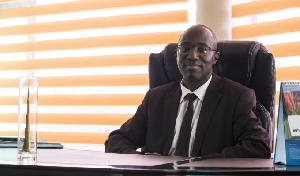The Chief Executive Officer (CEO) of Global Access Savings and Loans, Enoch B. Donkor, says government’s much-touted economic turnaround project needs to be sustained further in order to translate into real gains for key actors in the economy.
Mr. Donkor was responding to a Finance Ministry press conference that said the economy is on a recovery path after three years of severe economic challenges which saw government turn to the International Monetary Fund (IMF) for assistance.
The Global Access Savings and Loans CEO said judging by the general performance of its clients, which are mostly small and medium enterprises (SMEs), the economy’s turnaround still has some way to go.
“Normally in January economic activities are slow but there is still demand for pure credit, albeit the demand is quite low… If I look at the demand for credit in January and February it is quite low and doesn’t give me any hope that the economy is really turning the corner fast.
“We judge the growth of our business by what our customers do; either depositing or taking credit. We also look at the patronage of our trade finance product. If I start from the bottom where SMEs patronise our trade finance products, I would say that indeed they are still doing business because the demand for our forex, say dollars, is encouraging,” Mr. Donkor said.
While the Finance Minister had insisted that the key economic indicators are showing positive signs, the Bank of Ghana in its November 2015 Financial Stability Report indicated that banks are seeing continuous growth in non-performing loans.
The report said as at September last year, NPL ratio had grown to 13.5 percent from 12.1 percent the same time in 2014, and the private sector’s contribution to this ratio is 97.4 percent.
Mr. Donkor ceded that the growing NPL ratio is indeed worrying and the financial institutions are strategising to cope with the trend.
“Sometimes you have very good clients who you think naturally should pay when their loans installments are due. But considering the fact that they may be engaged in commerce and not getting payment for their goods and services, they may have some difficulties.
“The BoG saying that the NPL is growing and because of that other pioneer institutions will squeeze credit may be true, and for our side an election year is a good year for giving credit; I think there is business. With what we are targeting, I know that the economy is not doing well so much; but if we strategise very well we can expand our business,” he maintained.
Mr. Donkor said concerns about fiscal discipline in an election year are quite legitimate and must not be overlooked by government.
“They should try to control expenditure as well as the revenue side. By doing so we stick to the budget. At the private sector, performance measurement is taken very seriously. The Public Service Commission has very good performance appraisal models, and if that can be implemented in the public sector there will be a difference.
Business News of Wednesday, 17 February 2016
Source: B&FT Online







![NPP Flagbearer, Dr. Mahamudu Bawumia [L] and NDC Flagbearer John Mahama NPP Flagbearer, Dr. Mahamudu Bawumia [L] and NDC Flagbearer John Mahama](https://cdn.ghanaweb.com/imagelib/pics/869/86902869.295.jpg)









